Film Noir #4
Noir: The Adventures of Ford Fairlane and Any Number Can Play
Figured on getting finally into B’s till afterthought that was Adventures of Ford Fairlane demanded noir placement, maybe a most eccentric choice so far, though there are stranger ones to come. I’ll go further and name Ford Fairlane top among private detective stories told to me during the eighties-nineties; it pleads the case that much noir came of those decades and ones ahead. As for Any Number Can Play, the private life of a professional gambler seems inherently noir, especially where it is Clark Gable and his having had history with such parts prior to 1949. Was Any Number till now too MGM-polished to qualify? As with instances before, just personal-liking it buys membership. Next entry promises to graduate from A's.
THE ADVENTURES OF FORD FAIRLANE (1990) --- It is an unfair world where The Adventures of Ford Fairlane cannot be accessed for streaming. Blu-Rays are out of print too, offered only at stiff price ($84.95, $73.36, on eBay). What other discs are so precious? For me, few, having been a FFF (Ford Fairlane Fan) since initial release in 1990. Why not a sequel, in fact further adventures running to a present day? Because frankly it flopped, 1990 being early application of cancel culture to wit Andrew Dice Clay, his act declared too raw for then-sensibilities (imagine now!). We could wonder if Ford like other disreputable 80-90’s goods is not only discontinued but suppressed (a lot of discs representing that period are also resolutely out-of-print). Rape of art I calls it, but so long as my bearded DVD (dual full frame, “widescreen” format) will play, then content I’ll be, others free to marvel that anyone should embrace such unutterable sleaze as Ford Fairlane. Noir then? Very much yes, even to a framing device to tell the tale in flashback, Ford a “Rock and Roll detective” after cracked Chandler fashion. His mean streets run through sordid 80’s dawning upon 90’s L.A., and outlandish though it all is, I applaud AFF for lighting up a lost world of thirty years back. Being nutsy blend of old and more decadent new, Ford comments on a music scene that makers clearly feel had gone to ruin, the title character taking time off his investigation to show a simp singer how rock/roll should be performed. That Ford harks back to 50’s “pure” R&R shows how lots spat upon music as it evolved past punk, metal, boy bands, the lot skewered by this private eye who despite obnoxious habits, lives like Philip Marlowe by his own code.
 |
| Andrew Dice Clay with Director Renny Harlin |
The Dice Man (his preferred moniker) is ragingly un-woke and a chatterbox of now forbidden quips, which may explain his expulsion from polite streams, all of which enhances my appreciation for him. Where are monuments for trashy pictures made back then? And pats upon backs of directors like Renny Harlin who supplied them? Has he apologized publicly for The Adventures of Ford Fairlane? (not at all … Harlin defends it bravely for interviews) I say give him a Life Achievement Award instead. Harlin’s latest is Class Reunion 3 (2021), “the first feature film shot in Finland in 35 years” (he hailed from there), which surely differs from any score of pics one could think of. Harlin hit a wall years back with Cutthroat Island (1995), which who knows, might be likeable as much as Ford Fairlane if I’d bother to watch. Die Hard 2 certainly has merit, and Cliffhanger stands tall among Stallones. Harlin also did a shark movie that was fun. Call my tastes corrupted by age thirty, and not improved since. If movies can’t be fine in Classic Era sense, then let them be violent and rude as a Harlin, Walter Hill, John Milius, Rowdy Harrington (perfect name for what he does), all my filmmaking heroes from a “Silver Age” of trash cinema. Long may banners fly for these!
ANY NUMBER CAN PLAY (1949) --- Had Gable's Blackie Gallagher ducked the chair in Manhattan Melodrama, he might have aged to the character presented here, but hold on, Blackie was never such a right guy as Charley Kyng, "A nut for human dignity" as straight-face described by one of Number's support cast. Kyng was husk of MGM's King as bled out by years of belling the cat per PCA enforcement (just compare A Free Soul or Red Dust's CG with anything he did after the war). Pleasure of Any Number Can Play won't be had, however, in quibble over this. We know going in that Gable is gelded, but who knew such effective drama would derive from mere witness to effect age had on this screen embodiment of he-manhood passing mid-years? There's no shrinking from the issue, Gable not vain where it came to expose of vulnerability that came with being 48. He seemed further along than that for intake of alcohol and nicotine, killers that would finish the actor in a decade and threaten his Charley Kyng here.
As good a scene as CG ever played is his Any Number intro. Doctor Leon Ames has come, in secret, to do a physical exam. He notes a weak heart and prescribes nitroglycerin tablets along with give-up of liquor and cigarettes (while lighting up himself to set a good example), wonderful evocation of what health care amounted to in the 40's, guys dedicated to habits that would kill them quickest. Ames' M.D. preaches moderation, but who/what lived by the word in 1949, when every ad and movie put cigarettes at forefront of upward mobility? We see in Any Number's Gable an early admission of what age and time had wrought, but how could that help boxoffice, especially with Metro still selling their star as cocksman in residence ("Gable's A Fighter ... Gable's A Lover" say tone-deaf ads).
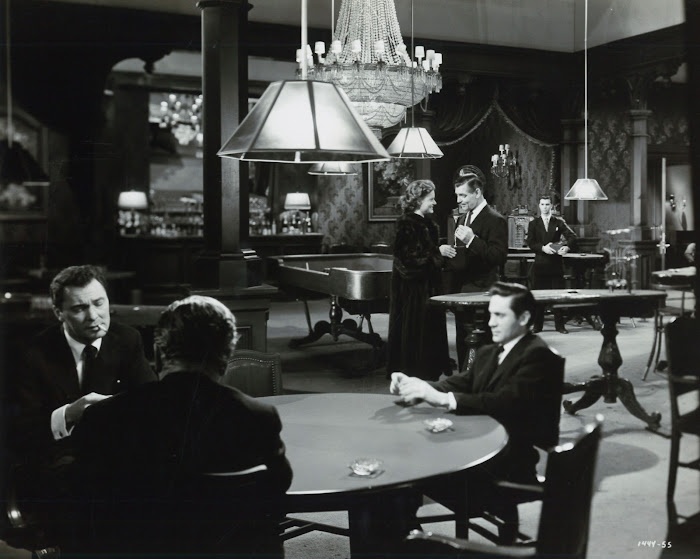 |
| Lush Set Where Much of Any Number Action Takes Place |
The trailer spoke it (slightly) better, proposing Gable in Any Number Can Play as "A Robust Composite Of All His Great Roles," which it was, and wasn't, considering that, for a first time, they'd acknowledge soft clay beneath feet of an indestructible persona. Much of Gable after the war was composite, Metro finding it tougher to construct vehicles for him. Trouble was timidity, the safe route too often preferred as no one was eager to chance fresher approach. Publicity did not mind pointing out old sage that was Gable, an on-lot presence since silent days. CG muffed a scene where he goes through papers on a desk, these routinely taken from old production department files where such props were needed. Gable recognized call sheets for The Merry Widow (1925), and saw his name listed among $7.50 per day extras. A laugh was had by all, said Any Number Can Play’s pressbook. Gable expressed interest in The Fountainhead, but the property went to Warners and his old rival Gary Cooper. Briefly-at-Culver Preston Sturges floated Gable as lead for a new comedy that would cast him as a high-powered industrialist who recharges a rural town, and yes, that sounds ideal for postwar CG, but diminishing gross on his films would shrink spending on Gable films, not an option where high-priced Sturges was proposed.
 |
| Back with His Old Hell Divers Partner Marjorie Rambeau |
Gable's postwar scorecard to 1949: Adventure, The Hucksters, and Homecoming all expensive, but profitable (Homecoming the best in that regard with a million gained). 1948's Command Decision lost money, and in hard parlance of dollar-cents, that meant belts tightened and neg costs cut from an average of two and a half million to less than half that for Any Number Can Play. Dore Schary had in meantime taken charge of production and the purse, his goal to trim waste wherever found, including star vehicles not pulling their weight. To this bloat he applied shears and pledged Any Number's finish for below a million, which he nearly achieved by virtue of producer Arthur Freed and director Mervyn LeRoy staging virtually all of action on two principal sets, a gambling casino and the Gable character's residence. Variety announced final tab at $750K, adjusted from earlier announced $1.1 million (actual cost was upwards of $1.4 million, still a comparative bargain). In a marketplace that was shrinking, pic companies took any opp to brag of economies, what with stockholders watching. To bring in a Clark Gable vehicle for so little seemed a step in right directions, but how did Gable view it?
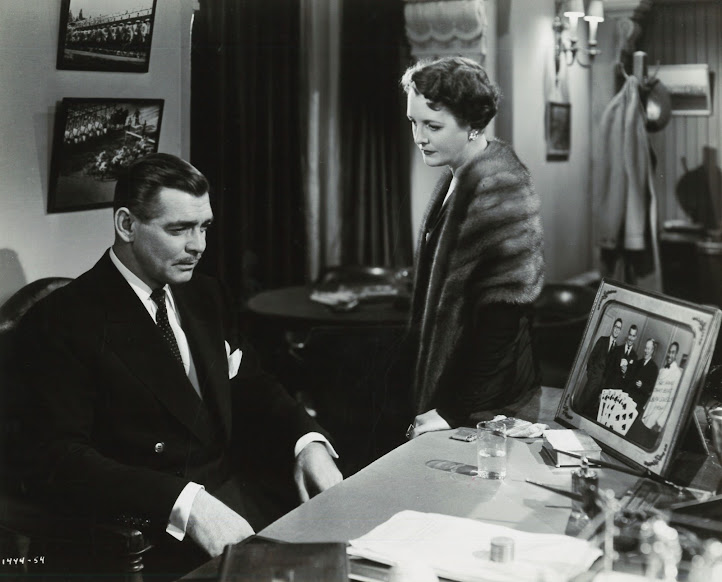 |
| Among Host of Character Greats Mary Astor, Here and Above Left, CG's Old Hearthrob from Red Dust |
The King sat uneasily on his throne, as aware, if not more so, than a diminishing audience that his last three films were less than helpful. A star "unhappy" with work was news to trades, which reported Gable demand that he be permitted an outside project for each year left of Metro pact. He got the concession, but would not exercise it. Did the King prefer grumbling to pro-action? The Sturges project had died on a vine of studio apprehension, and now came budget cuts to remain policy on future Gables. Arthur Freed as assigned producer on Any Number Can Play might enhance its outcome, as Freed gave care to whatever venture his unit supervised. Richard Brooks, an up-and-comer, wrote the script, and a first-drawer support cast tied up what at times was diffuse narrative. MGM's one-sheet called their new Gable "His Most Exciting Picture in Years," which didn't flatter earlier ones, but those were spent bread, and what mattered now was fresh loaf paying. Any Number Can Play actually grossed the least of any Gable since the war, but as costs were held down, finish was profitable to tune of $770K. It's available on DVD and has been shown in HD on TCM.
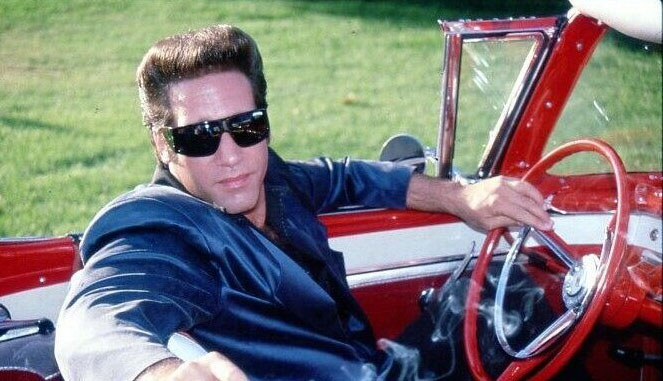




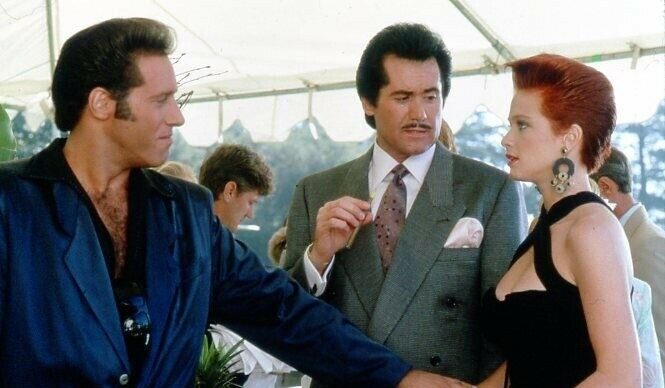
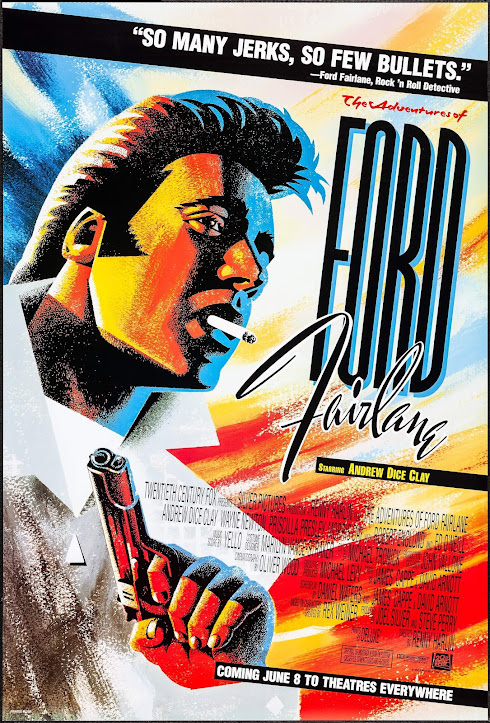
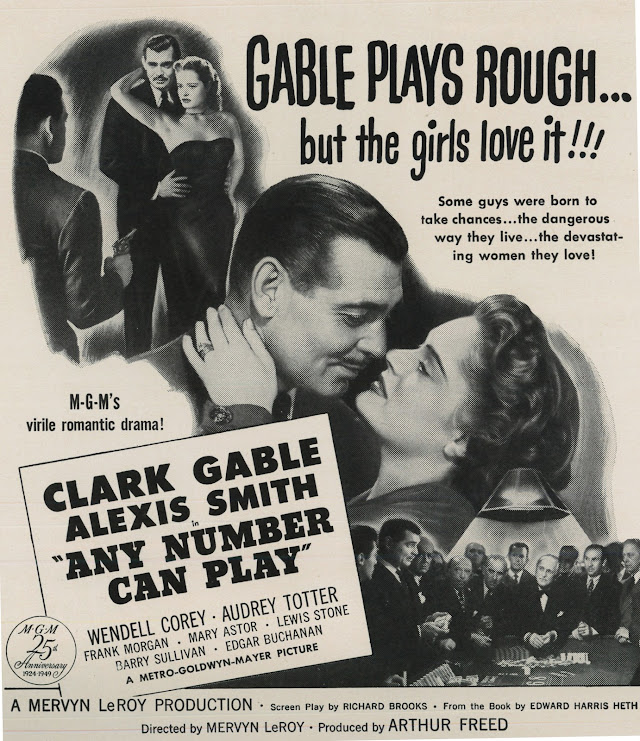

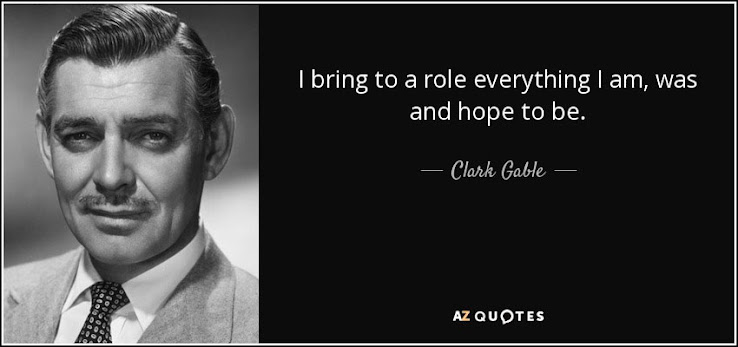


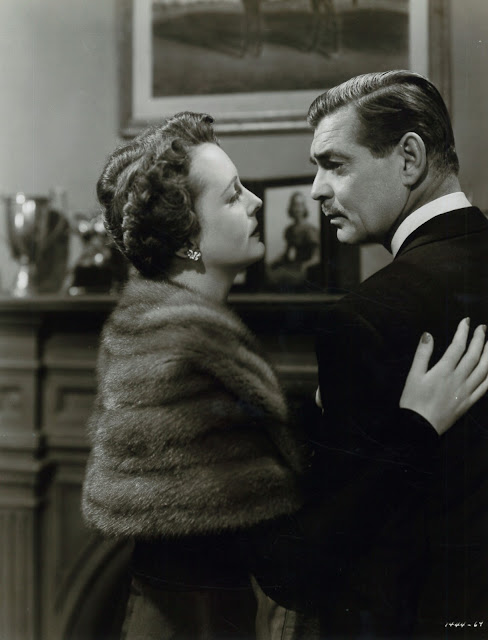

9 Comments:
Watch CUTTHROAT ISLAND, it a lot of fun and every penny of the $100 million dollar budget is on the screen and no CGI.
The Ford Fairlane comic book:
https://www.misterkitty.org/extras/stupidcovers/stupidcomics203.html
I cut the theatrical trailer for 'The Adventures of Ford Fairlaine.' I remember it being a very funny film.
And no reference to Harlin's magnum opus THE LONG KISS GOODNIGHT?
Andrew Dice Clay on Greenbriar? Now I've seen everything. Except The Adventures of Ford Fairlaine.
Can't remember a thing about seeing FORD FAIRLAINE when it came out except that I liked it a lot. Love to see it again.
The Preston Sturges project that floated Gable as a high-powered industrialist in a rural town was called "Nothing Doing." The script was recently uploaded to the Internet Archive:
https://archive.org/details/nothing-doing-preston-sturges/mode/2up
"Nothing Doing" would not have been a masterpiece, but it certainly would have been better than Sturges's last Hollywood film, the miserable "Beautiful Blonde from Bashful Bend."
I remember little about FORD FAIRLAINE itself. Just that Clay and Fox got into it over who was to blame for the film's failure, with Fox dumping a live performance film starring Clay that they had planned to release as a follow-up.
To be fair, though, it's probably been at least that long since I saw ANY NUMBER CAN PLAY, and I don't remember much about that, either.
NO TECHNICOLOR FOR GABLE UNTIL Louie left as boss in 1949. Very strange, while other big stars at other studios were seen in TECHNICOLOR all over the screens-- before AND after the war! Ironic that his last picture at MGM WAS titled BETRAYED (1953), and filmed-- in dreadful ANSCOCOLOR!!
Post a Comment
<< Home